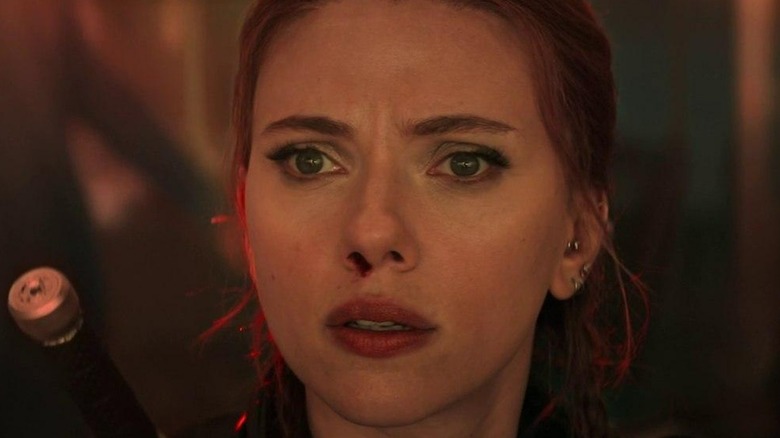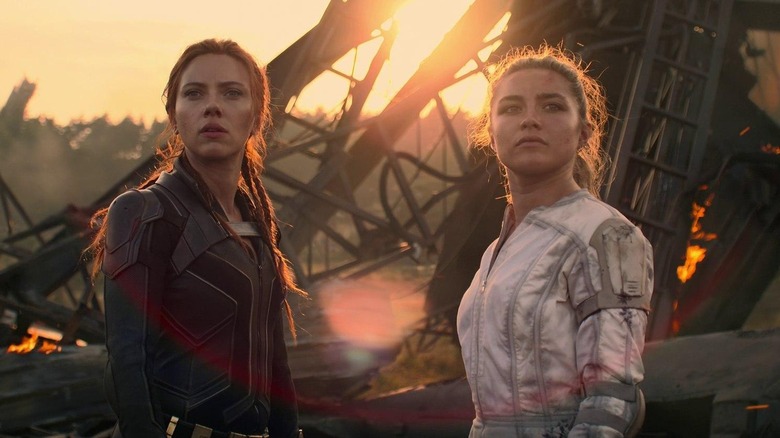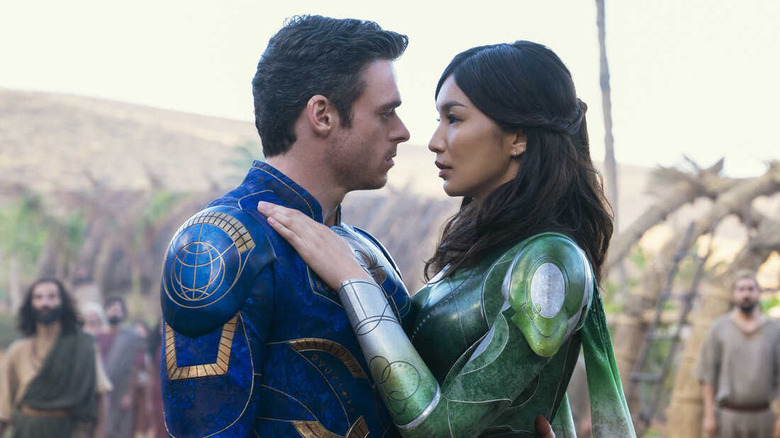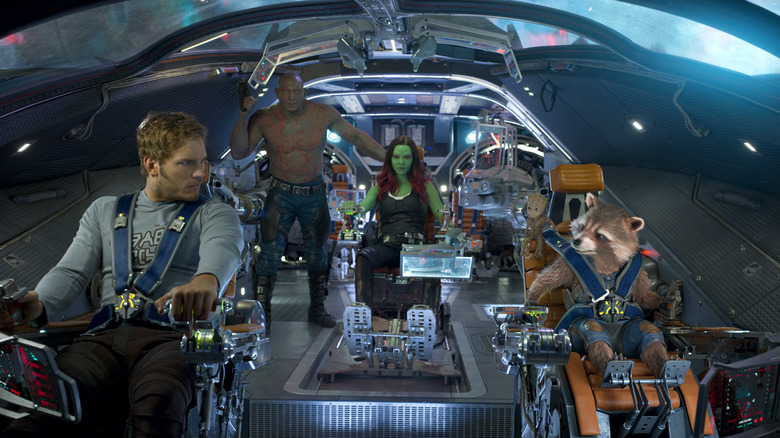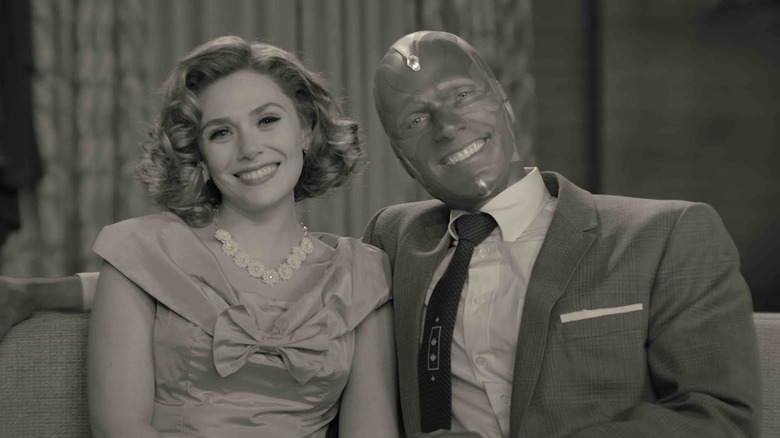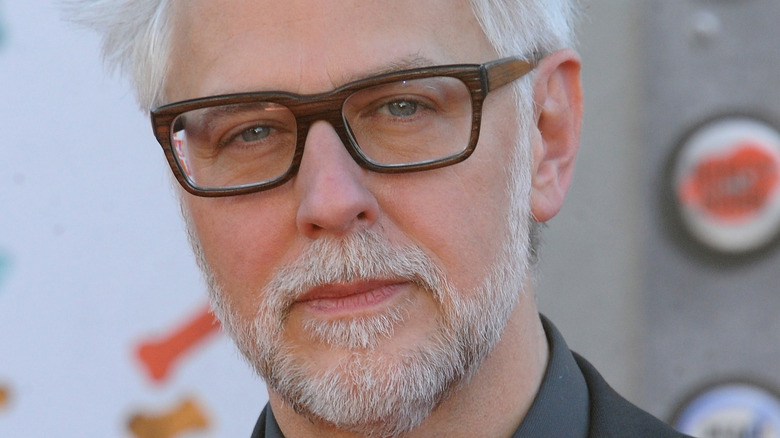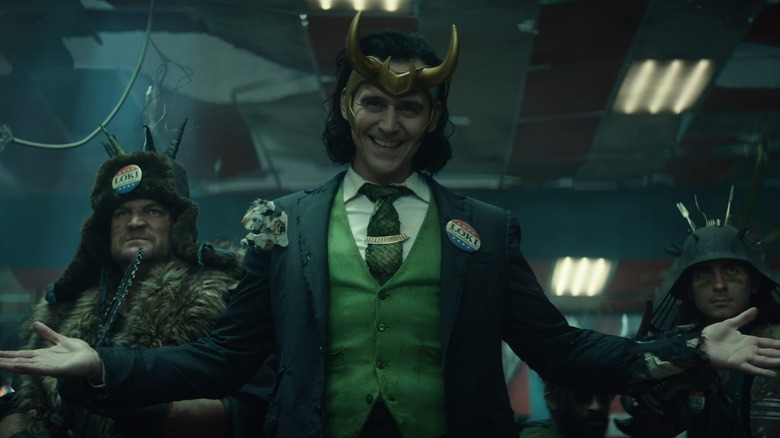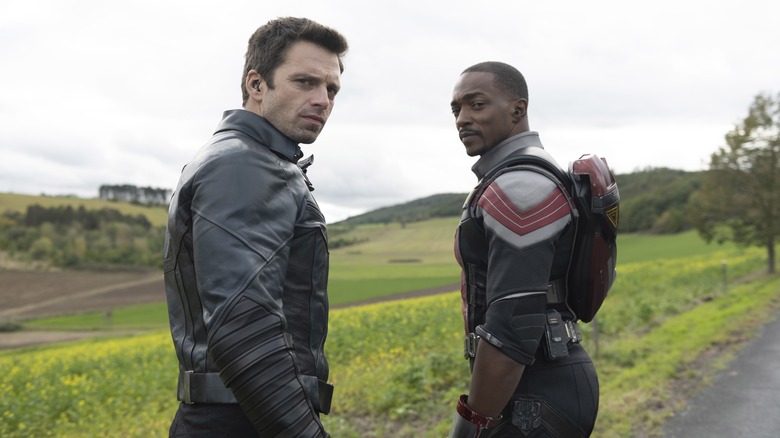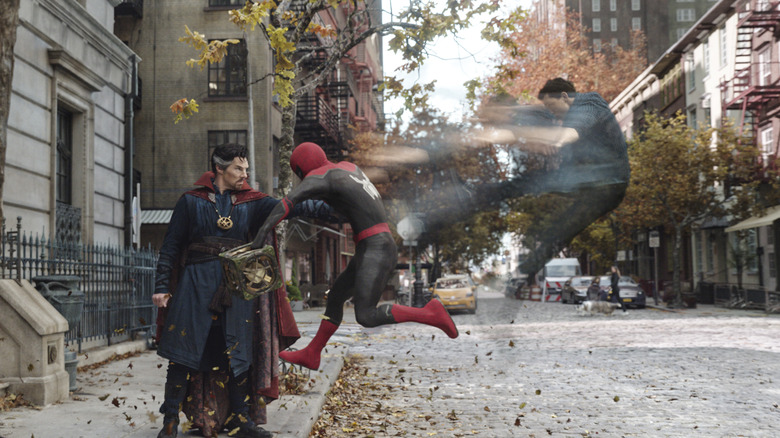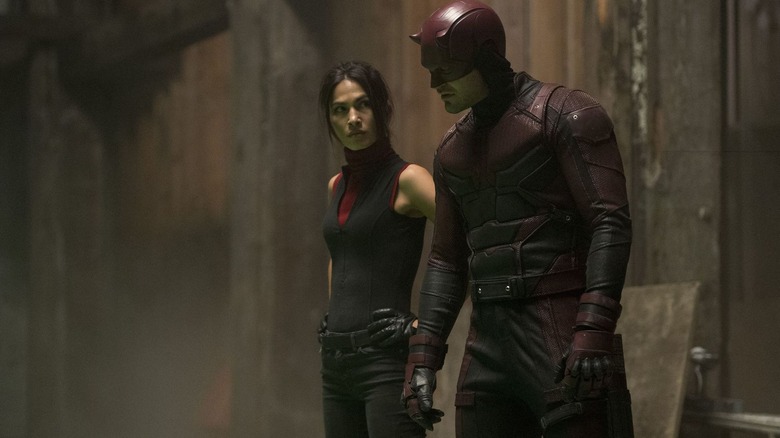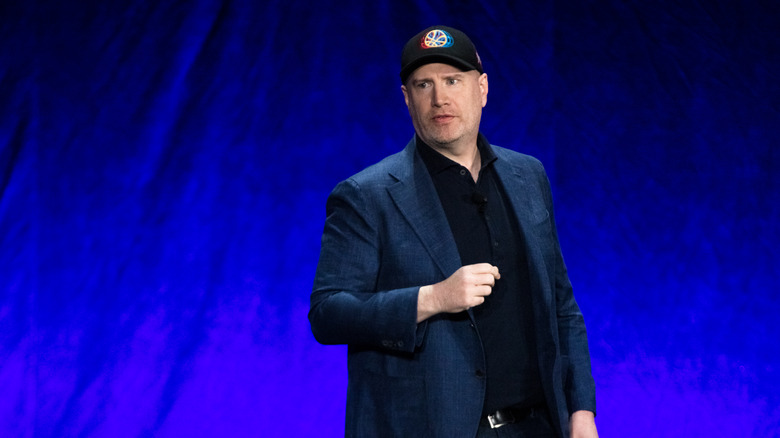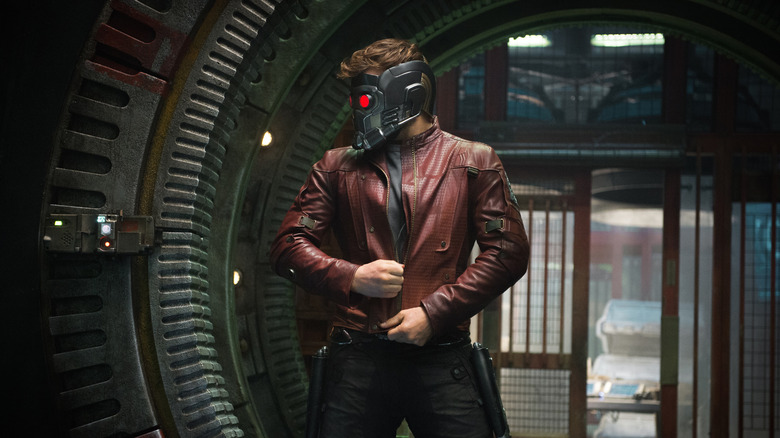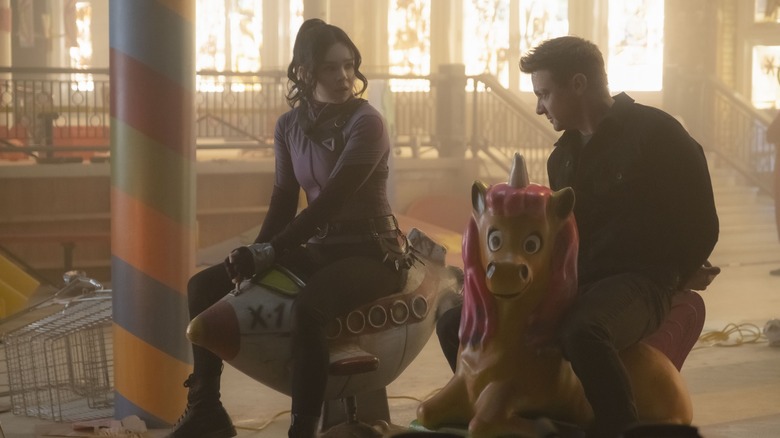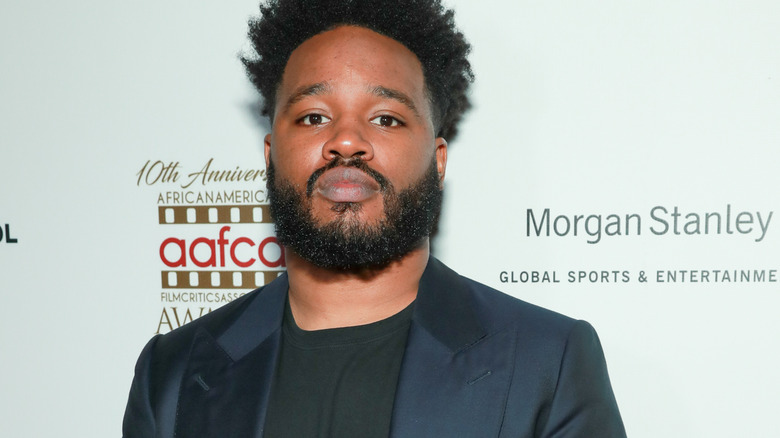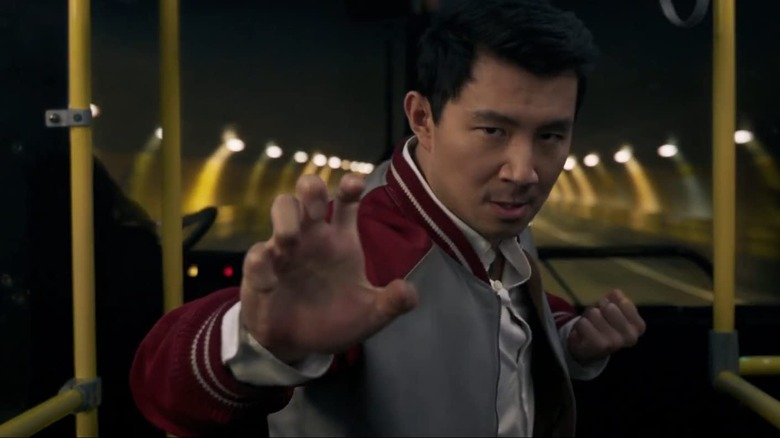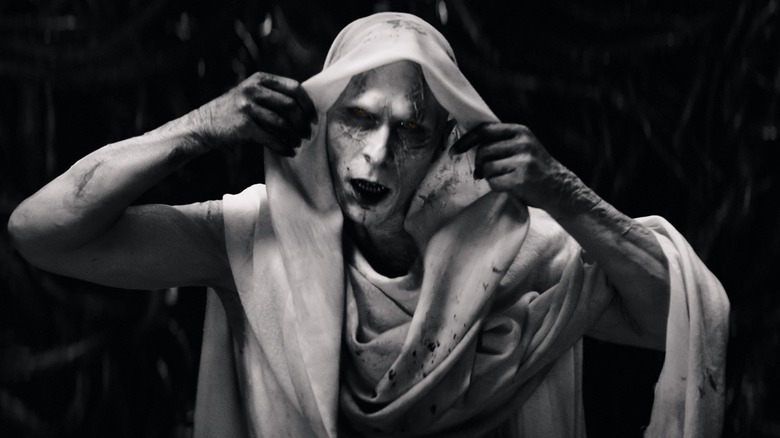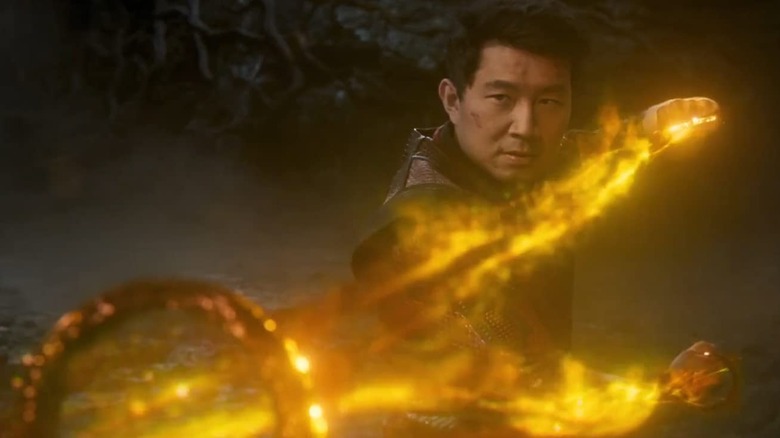The Untold Truth Of The MCU's Phase Four
The lore of Phase Four within the individual installments of the Marvel Cinematic Universe has largely revolved around the presence of the Multiverse, the incorporation of Marvel movie characters created before this franchise ever existed, and the introduction of assorted anti-heroes like Yelena Belova or Echo. There's been lots to juggle in this stretch of the worldwide phenomenon that is the Marvel Cinematic Universe. However, the saga of Phase Four is not just confined to what audiences see on the screen. It also entails the arduous behind-the-scenes efforts responsible for making this collection of movies and TV shows exist in the first place.
The story behind Phase Four covers everything from how long certain projects in this endeavor took to make, the evolving presence of certain filmmakers, and even how flexible Phase Four has been in suddenly incorporating new titles. Phase Four of the Marvel Cinematic Universe has already been full of unexpected and memorable sights, but this era of the franchise also has lots of fascinating details buried within its behind-the-scenes process.
Plans for Phase Four have been gestating for a long time
Kevin Feige has never made it a secret that he likes to plan out projects in the Marvel Cinematic Universe far out in advance. Back in August 2013, when "Thor: The Dark World" was still an upcoming project, he revealed that films in this franchise that would release in 2021 were already being talked about. The following year, he announced that Marvel had plans for motion pictures laid out through 2028. Feige himself has also been open that sometimes these plans do change to account for things like teaming up with Sony/Columbia Pictures to produce "Spider-Man" movies, but there are still always ambitions in place for what the future of the Marvel Cinematic Universe could look like.
In a 2016 interview with Collider, Feige confirmed that Marvel Studios had specific films in mind that it wanted to release on a handful of 2020 release dates. Though this was when "Doctor Strange," only the second film in Phase Three, was beginning to get off the ground, Feige was still openly talking about how the studio had concrete ambitions for what it wanted the first few Phase Four features to be.
Marvel Studios almost abandoned the term Phase Four
In April 2017, Kevin Feige explained that plans were already well underway for what the Marvel Cinematic Universe would look like after Phase Three of the franchise was complete. Though at the time he was vague on the specifics, he did note that there were notions that the term Phase may be abandoned. A staple of the Marvel Cinematic Universe since its inception, Feige explained to Collider that what follows Phase Three may not be "Phase Four, it might be a new thing."
Apparently, part of that newness would include finding a new term to refer to a collection of Marvel Cinematic Universe titles or even abandoning the practice of grouping installments in this franchise like that altogether. In retrospect, it's easy to see why Feige would harbor such feelings given how "Avengers: Endgame," the penultimate entry in Phase Three, was such a gargantuan game-changer for the Marvel Cinematic Universe. It would only make sense that part of the changes going forward from such a movie would potentially include new terminology for how the various features are organized. However, this potential abandonment of the Phases term never came to pass, with Kevin Feige officially disclosing details about Phase Four at the San Diego International Comic-Con in July 2019.
Guardians of the Galaxy Vol. 3 was supposed to start Phase Four
After many delays brought on by the COVID-19 pandemic, Phase Four of the Marvel Cinematic Universe began with "Black Widow" in July 2021. However, in an alternate timeline, Phase Four would've kicked off with a drastically different feature. Initially, the first post-Phase Three entry in this saga would've been "Guardians of the Galaxy Vol. 3," which was penciled in for a May 2020 opening. This would've not only paralleled the early May debut of the second "Guardians of the Galaxy", but the three-year gap between "Vol. 3" and its predecessor would've mirrored the wait time between the first two "Guardians of the Galaxy" installments.
Having Phase Four get kicked off with a buzzy sequel like "Guardians of the Galaxy Vol. 3" would've been doubtlessly a boon for this saga. However, those plans got scuttled in July 2018 when James Gunn was fired from "Guardians of the Galaxy Vol. 3" after controversy from right-wing media outlets erupted over the filmmaker's controversial tweets from years earlier. With Gunn gone, there were initially reports that Marvel Studios planned to move forward with "Guardians of the Galaxy Vol. 3" and get it out in time for a May 2020 debut. However, Gunn would eventually be welcomed back to the project, though his commitments to "The Suicide Squad" ensured "Vol. 3" would have to wait until May 2023. This opened the door for "Black Widow" to take over as the debut Phase Four film.
The original plans for how long Phase Four would run
At the 2019 edition of the San Diego International Comic-Con, Kevin Feige announced a bevy of projects to attendees that were all a part of Phase Four of the Marvel Cinematic Universe. However, the movies and TV shows he discussed here largely (save for a reveal of a then-undated "Blade" movie) stretched on only until November 2022. This led to understandable questions on if this was the entirety of Phase Four or if this part of the Marvel Cinematic Universe would stretch on into 2022 and beyond. Afterward, Feige clarified that the plan was for Phase Four to last just two years across 2020 and 2021, with this stretch of the franchise beginning with "Black Widow" and concluding with "Thor: Love and Thunder."
However, several factors occurred in the years since that have altered how long Phase Four runs. For one thing, the COVID-19 pandemic delayed everything to such a spectacular degree that Phase Four wouldn't begin until the January 2021 TV miniseries "WandaVision." For another, further Marvel Cinematic Universe projects within Phase Four have been announced since that Comic-Con unveiling, including "Black Panther: Wakanda Forever" and "The Marvels." It's still unclear how long Phase Four will last, let alone what specific projects will mark its conclusion, but it's clear that it's going on longer than initially planned.
James Gunn's original extra role in Phase Four
As "Guardians of the Galaxy Vol. 2" hit movie theaters, writer/director James Gunn confirmed his intent to make a third installment in this sci-fi series. While Gunn reaffirmed even back in 2017 that this would be the final "Guardians" film he'd write and direct, he did note that his influence would be felt in the Marvel Cinematic Universe beyond just the "Guardians" franchise. Speaking to on Facebook Live (per /Film), Gunn revealed that he would be helping to mold the vision for the cosmic side of the Marvel Cinematic Universe, which would reverberate throughout multiple movies for years to come.
Gunn did not specify what kind of Phase Four projects he would be involved in, though this potential influence got sidetracked once Gunn was temporarily fired from directing "Guardians of the Galaxy Vol. 3." Though he would be later reinstated to this job, Gunn's focus on "The Suicide Squad" and "Peacemaker" kept him busy in the years before he started shooting the third "Guardians" chapter. Though Gunn has yet to follow up on whether or not he was able to exert this influence on the cosmic adventures of Phase Four, the lack of further mention of Gunn's responsibilities in this regard, not to mention the filmmaker's busy schedule, make it seem like this part of planning out Phase Four never quite came to fruition.
The earliest rumblings of Phase Four involving TV shows
Years before Kevin Feige and other Marvel Studios brass began officially confirming what productions would make up Phase Four of the Marvel Cinematic Universe, rumors abounded about what particular movies would make up this stretch of the saga's history. But it wasn't until 2018 that the concept of a new way of Marvel Cinematic Universe storytelling emerged. This is when Variety broke the news that Marvel Studios was developing a collection of TV shows for the then-upcoming Disney+ streaming platform. The news revealed that these small-screen endeavors would focus on characters like Loki or Wanda Maximoff that hadn't yet received their own solo big-screen outings.
This news was impactful for a variety of reasons, but especially because it revealed that Marvel Studios itself, for the first time, was planning to get into television. Up to this point, even small-screen programming that utilized characters from Marvel Cinematic Universe movies like "Agent Carter" had been made outside of the company. Instead, they were created within its sister division, Marvel Television. But with this new wrinkle in Phase Four, Marvel Studios would be expanding its narrative horizons. In the process, this early rumor guaranteed that Phase Four was going to be unlike any other Phase to date in the Marvel Cinematic Universe.
The commitment to MCU movies and TV shows crossing over
When he first started to publicly talk about the prospect of Marvel Studios making original Marvel Cinematic Universe programming for the Disney+ platform, one thing Kevin Feige was very insistent on was that these shows would not be removed from the continuity of this franchise's movies. Back in February 2019, Feige told Comicbook.com that these Disney+ programs would be "entirely interwoven" with the then-upcoming slate of Phase Four Marvel Cinematic Universe theatrical releases. This was in sharp contrast to how previous TV shows based on Marvel characters, like "Agents of S.H.I.E.L.D.," tended to function as largely separate from the feature-length narratives in the Marvel Cinematic Universe.
Since these initial comments, Phase Four of this franchise has managed to live up to Feige's words. "WandaVision" set the stage for Wanda Maximoff's villainous behavior in "Doctor Strange in the Multiverse of Madness," while "Ms. Marvel" sets up its titular superhero so that she can serve as one of the leads of the 2023 project "The Marvels." Yelena Belova from "Black Widow" also showed up in a guest star capacity on "Hawkeye," while Jonathan Majors debuted as a version of Kang the Conqueror on "Loki" before appearing as the villain of "Ant-Man and the Wasp: Quantumania." With these and other pieces of connective tissue afoot, it's clear Feige's mission to narrow the gap between big and small-screen storytelling in Phase Four is coming to pass.
The varying amounts of time Phase Four projects have been gestating
Rome wasn't built in a day, and Marvel Cinematic Universe movies are also not created overnight. In talking to Rotten Tomatoes in June 2021, just as "Black Widow" was ready to premiere in theaters, Kevin Feige said that the prep work for Phase Four had largely been done over a five- or six-year period. However, he also observed that other characters in this stretch of the Marvel Cinematic Universe had been worked on for much longer than that. Specifically, he noted that the character of Shang-Chi had been worked on in some way shape, or form in the Marvel Cinematic Universe for "10 or 15 years."
Such words aren't just PR hype from Feige. Back in 2005, The Los Angeles Times reported on the creation of Marvel Studios and its intent to produce self-financed movies by revealing that one of the characters that were being eyeballed to get a movie was Shang-Chi. That was the first mention of this character being a potential big-screen leading man, which ended up culminating in the 2021 title "Shang-Chi and the Legend of the Ten Rings." The lengthy amount of time it took for Shang-Chi to reach movie theaters isn't the norm for all Marvel Cinematic Universe projects, but it does reflect how long it took for certain Phase Four projects to reach their final forms.
Spider-Man: No Way Home was not originally part of Phase Four
Looking back on the Phase Four movies announced by Marvel Studios at San Diego International Comic-Con panel in 2019, one can see immediately recognizable titles. Productions like "Doctor Strange in the Multiverse of Madness" and "Thor: Love and Thunder" were among the buzziest things to get announced at this event. But one noticeable Marvel Studios Phase Four film absent from this event was "Spider-Man: No Way Home." This was despite "Spider-Man: Far From Home" opening a few weeks before the panel and going on to crack $1.1 billion worldwide.
It would later turn out that its absence was no mistake, as Sony/Columbia Pictures and Marvel Studios were in the middle of negotiations at the time over the future of Spider-Man on-screen. This would eventually result in the two companies parting ways in August 2019, with Sony/Columbia planning to continue the exploits of Tom Holland's Spider-Man in their own solo movies. Eventually, an agreement would get signed that would reunite the two companies together to create another solo "Spider-Man" movie, which resulted in "Spider-Man: No Way Home." However, long before that record-shattering feature dropped into theaters, "No Way Home" initially looked like it would have no place in the elaborate plans for Phase Four.
The official arrival of Marvel/Netflix characters in Phase Four
In the first three Phases of the Marvel Cinematic Universe, it was difficult to figure out how connected to the broader franchise Marvel/Netflix characters like Daredevil, Jessica Jones, or Luke Cage were. While individual TV programs like "Daredevil" would reference Thor's hammer or namedrop Captain America, the Marvel Cinematic Universe feature films never made similar gestures towards these productions. Once the Marvel/Netflix shows were axed in late 2018 and early 2019, it seemed like this chapter of Marvel storytelling had come to a close.
However, coinciding with the cancellation of those programs was the absorption of Marvel Television into Marvel Studios. The two entities had previously been wholly separate, complicating any potential crossovers between their projects. However, now that they were under the same umbrella, small-screen Marvel projects could now be more easily ingrained into the wider Marvel Cinematic Universe. In 2021, an especially exciting example of this kind of integration was seen in "Spider-Man: No Way Home," where Charlie Cox's Matt Murdoch/Daredevil made a cameo appearance. It was the first time a Marvel/Netflix figure showed up in a Marvel Cinematic Universe movie. This, along with Vincent D'Onofrio portraying Wilson Fisk/Kingpin on "Hawkeye," solidified that Phase Four was when the dreams of many fans would finally come true. Though it had been years since the first season of "Daredevil" dropped, the Marvel/Netflix universe was finally getting to cross over with the bigger Marvel Cinematic Universe canvas.
Kevin Feige's claim of the only COVID-influenced change in Phase Four
It's difficult to imagine there being only one change to Phase Four of the Marvel Cinematic Universe in response to the COVID-19 pandemic. After all, there are so many movies and TV shows to juggle in this saga, and so many characters and intertwining storylines in all of those individual productions, that it's impossible to conceive that this global health crisis inspired a solitary change across the long-term plans of this collection of properties. However, speaking to "On the Red Carpet," Feige claimed that only one significant change had occurred in response to the pandemic.
Per Feige, a character in the post-credits scene of "Black Widow" was supposed to make their Marvel Cinematic Universe debut in this sequence. However, that figure ended up premiering early in the "Falcon and the Winter Soldier" TV show instead due to the timeline of when projects got released were shifted around thanks to COVID-19. Feige is referring to Valentina Allegra de Fontaine (Julia Louis-Dreyfus), a secretive character with known connections to Phase Four figures like Yelena (Florence Pugh) and John Walker/U.S. Agent (Wyatt Russell). While it's doubtful this is the only change to Phase Four's plans, outside of release dates, informed by the pandemic, it is the only alteration of this kind that Feige has been public about to date.
The introduction of Marvel Cinematic Universe TV specials
Phase Four's new forms of Marvel Cinematic Universe storytelling aren't just limited to Disney+ miniseries. This franchise is also delivering narratives told within holiday TV specials delivered to the Disney+ platform. Once the domain of Rankin-Bass programming like "Rudolph the Red-Nosed Reindeer," Marvel Studios is entering this storytelling mold to tell grander narratives that can also double as festive entertainment tied to the biggest holidays of the year.
The first reveal of these projects even existing in the Marvel Cinematic Universe came with the announcement of the "Guardians of the Galaxy Holiday Special" in December 2020. A longtime passion project for writer/director James Gunn, the production was confirmed to be a helpful prologue to "Guardians of the Galaxy Vol. 3" by Gunn in April 2021. With this reveal, it became apparent that these holiday specials weren't disposable goofs but essential parts of the Phase Four narrative. This isn't the only holiday special on the docket for Phase Four either, as an untitled Halloween special focused on the Werewolf by Night character directed by Michael Giacchino is also on the way. With these two projects, Phase Four continues to reshape what kind of forms Marvel Cinematic Universe narratives can take.
Hawkeye was originally supposed to be a movie
To bring to life some of its Disney+ programming, the various branches of The Walt Disney Company have turned to taking screenplays for unproduced movies and translating them into longer six-episode event shows. The most high-profile example of this across the streaming programming has been "Obi-Wan Kenobi," which apparently utilized enough key plot points and characters from a planned "Obi-Wan Kenobi" movie to give that feature's screenwriter on-screen credit.
A lesser known but still notable example of this trend can also be found in one of the Phase Four TV shows, "Hawkeye." Apparently, Jeremy Renner had previously signed on and been told about the story of this program when it was a feature film. However, "Hawkeye" would eventually morph from Phase Four theatrical motion picture into one of the first Disney+ shows created by Marvel Studios. Renner was apparently fine with this transition, hence his participation in the "Hawkeye" program. However, the ability for Marvel Studios to transform a prospective movie into a TV show with ease demonstrates that the company has been looking to make elongated movies rather than traditional episodic television with most of its Phase Four small-screen productions. It also reflects the ambitions of Disney as a streaming empire, one that won't let any feature film script go to waste when it can be used to build up the Disney+ library.
Marvel Studios has deepened relationships with certain directors
For Phase 4 of the Marvel Cinematic Universe, Marvel Studios has tried to create even deeper bonds than usual with some of its most important talent. This is in sharp contrast to the previous eras of the company's history. Save for a three-year contract in 2012 keeping Joss Whedon around to work on assorted Marvel Cinematic Universe projects, Marvel Studios hasn't kept filmmakers under long-term contractual obligations. This has made it extra easier for directors like Scott Derrickson and Jon Watts to leave prospective Marvel Cinematic Universe directorial gigs without having to navigate how it'll impact their contractual obligations for the studio.
But that's changed with Phase Four, with Ryan Coogler being the most notable example of somebody who opted to sign on to work with Marvel Studios in the long haul. As part of his overall contract to oversee productions for Marvel Studios parent company Disney, Coogler was also on the hook to oversee a new Disney+ Marvel show set in Wakanda. At the end of 2021, the announcement of "Shang-Chi and the Legend of the Ten Rings" director Destin Daniel Cretton helming a sequel to that Marvel Cinematic Universe installment came with the news that Cretton had signed a long-term contract with Marvel Studios. For Phase Four, Marvel Studios wanted to keep talented artists in its good graces on a long-term basis.
Phase Four's commitment to theatrical exhibition
Throughout the ongoing COVID-19 pandemic, movie studios have begun to debut things on streaming that never before would've even been conceived for small-screen premieres. Would new Pixar titles ever have been thought of as fodder for straight-to-streaming debuts? Similarly, would a mammoth blockbuster like "Dune" ever have gotten a simultaneous HBO Max launch in any other era? This global health crisis has inspired unprecedented actions from every industry on the planet, so it should be no surprise that the entertainment industry has also gone in unexpected directions in exploring what can and doesn't qualify as a theatrical release.
Talking to Rotten Tomatoes, Kevin Feige explained that, even with consciousness over how the pandemic affected movie theaters, the feature-length efforts from Marvel Studios were never considered for streaming exclusive debuts. In this same interview, Feige recalled how his favorite experiences with these movies were watching them with enthusiastic crowds on the big screen. Considering that, Feige noted that he had remained dedicated to keeping the movies in Phase Four as theatrical events even with the unpredictability of the COVID-19 pandemic. In a film industry rocked by uncertainty, Feige's dedication in this regard is a stable harbor in a rocky sea.
Phase Four's ongoing release date shifts
While the Marvel Cinematic Universe has a reputation for maintaining a long-standing and reliable plan for its productions, this franchise has been as prone as anybody to delaying projects under certain circumstances. "The Avengers" was originally set to debut in July 2011, for instance, before getting delayed to May 2012. Similarly, "Doctor Strange" was postponed by four months from its initial July 2016 bow to ensure that Benedict Cumberbatch could play the titular superhero. However, Phase Four of the Marvel Cinematic Universe has taken the cake in terms of release date shuffles thanks to the ongoing effects of the COVID-19 pandemic.
Some films in Phase Four have had to move around more often than others due to this global health crisis. "Thor: Love and Thunder" has been one project that has been especially vulnerable to release date tweaks. Initially set for a November 2021 premiere when it was first announced in July 2019, "Thor: Love and Thunder" would eventually get delayed multiple times, including briefly scoring a Valentine's Day weekend opening, before settling on a July 2022 launch date. Other projects like "Black Widow" and "Eternals" received a year or more's worth of delays due to the pandemic.
The unique box office runs of the first Phase Four titles
2021 was an odd year for the theatrical box office in North America. Features came roaring back to movie theaters, and many managed to do solid box office numbers. However, with the COVID-19 vaccines still making their way across the general populace, there were varying degrees of comfort with theatrical moviegoing. This, and plenty of other factors, doubtlessly impacted the worldwide box office returns of the first three installments in Phase Four, "Black Widow," "Shang-Chi and the Legend of the Ten Rings," and "Eternals." This trio of projects scored the lowest worldwide box office hauls for any Marvel Cinematic Universe project outside of "The Incredible Hulk," with "Black Widow" being only the second project in this series to make under $400 million globally.
However, there was some context needed to better understand these grosses. For starters, "Black Widow" was given a simultaneous premium-video-on-demand debut on Disney+, which doubtlessly cut into its grosses. Even more importantly, none of these movies got released in China. Every Marvel Studios project released in this territory from 2017 to 2019 exceeded $100 million, with all three of the company's 2019 productions grossing over $150 million in China alone. A standard theatrical box office haul in China would've boosted all three movies past the $500 million worldwide mark. Still, all three found some form of box office success, particularly "Shang-Chi" which temporarily was the biggest movie of 2021 domestically, before "Spider-Man: No Way Home" returned the franchise to its traditional box office glory.
